10-minute read
keywords: biography, history of science
There are many famous scholars that I only know by name, so, lately, I have been developing a taste for science biographies. With the publication last month of Alexander von Humboldt: A Concise Biography, he was the next scholar to come onto my radar. However, I felt I could not do this subject justice without also considering Andrea Wulf’s highly-regarded 2015 biography The Invention of Nature, which won a slew of prizes and nominations. This, then, is the first of a two-part review of the long and remarkable life of Prussian naturalist, scholar, and explorer Alexander von Humboldt.
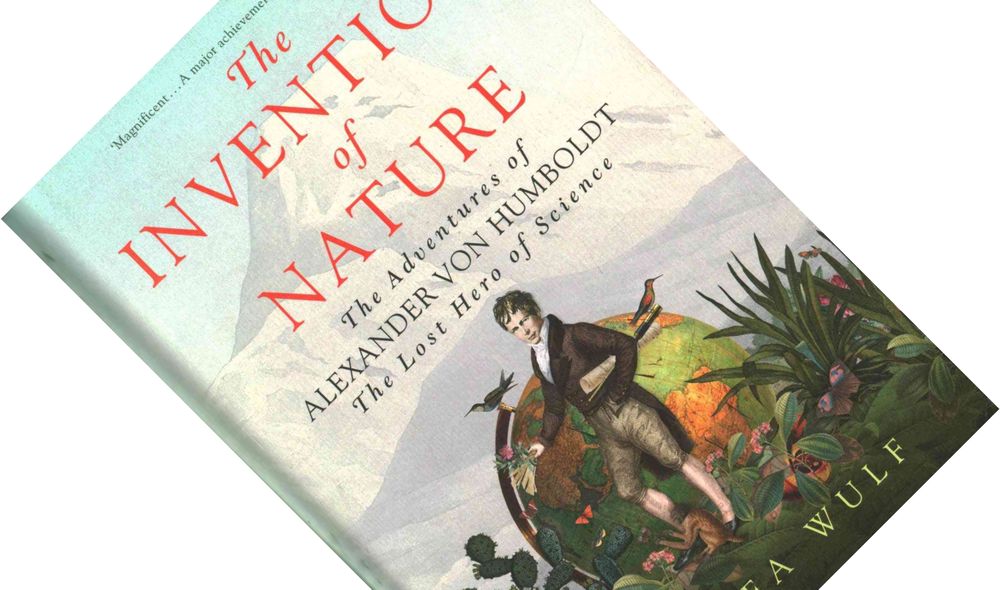
The Invention of Nature: The Adventures of Alexander Von Humboldt, the Lost Hero of Science, written by Andrea Wulf, published by John Murray in October 2015 (hardback, 473 pages)
You may well ask: why bother, why read two biographies? Is that not simply repetitive? I have several answers to these questions. The prosaic one is that I bought a copy some years ago, did not yet get around to reading it, and have heard good things about it. More importantly, however, is that the amount of scholarship on any topic or person is often dizzying (as is the case here) and taking any one person’s word as the final say is foolhardy. Yes, there will be inevitable repetition, but biographies are more than statements of facts. Each biographer will write for different audiences and approach their subject differently, accentuating some sides while downplaying others. People are complicated and multifaceted, so developing a fuller picture of someone is an iterative process. My thinking on this is hardly original. Science historian Nicolaas A. Rupke did just such a comparative exercise back in 2005, writing a “metabiography” that showed how the many different Humboldt biographies are products of their time that reveal as much about their writers as about their subject. In that light, consider the biographies I recommend below as starting points only!
Born in Prussia (today’s Germany did not yet exist), Alexander von Humboldt (1769—1859) was born to a wealthy family as the younger of two sons. Age 9 his father died, age 27 his mother. Liberated from their vision of a conventional career (he had trained as a mining inspector), and now in possession of a large inheritance, he pursued what he is best remembered for: a five-year exploration of the Americas (1799–1804). In true polymath fashion, he ranged across disciplines, collecting observations on, amongst others, zoology, botany, geography, history, agriculture, and politics. He spent two decades in Paris, turned his journey into influential books, including the hugely popular Views of Nature, and became an intellectual rock star. All the while he was supported by the Prussian king Wilhelm Friedrich III on a generous chamberlain’s pension, no strings attached; until of course there were and he was recalled to Berlin in 1827. Though his plans to explore the Himalayas never came to fruition, he remained ever-restless and, age 59, convinced tsar Nicholas I to finance a journey across Russia. Returning to Berlin with yet more ideas and observations, he continued writing and lecturing and, age 65, hit on the madcap idea to write a book, Kosmos, that would represent the whole material world. Taking a decade to complete, it became a bestseller. Realising he had yet more to say, it spawned four follow-up volumes[1] that consumed the remainder of his life until his death age 89.
Above facts are remarkable enough, and Wulf follows a strategy of taking notable episodes from his life and elaborating on them in lively detail in this chunky, 473-page book. But, given that I just wrote that biographies are more than statements of facts, I want to highlight three noticeable aspects.
“His journey through Russia in old age was a revitalizing experience, especially once he defied the authorities by going off-piste in a well-told episode that had me pealing with laughter at his audacity.”
First is Humboldt’s character. Wulf does not have to psychoanalyse him as his contemporaries already did some of that. Correspondence between his brother Wilhelm and his brother’s wife Caroline explains Alexander’s unhappy childhood. The early loss of his father saw him search for a replacement in his private tutors while he felt incompetent compared to his precocious older brother. His mother was emotionally distant and though Wilhelm took care of her for 15 months when she fell terminally ill, neither brother chose to be there when she died or attend the funeral. All this meant Humboldt was haunted by feelings of insecurity his whole life. He was forever possessed of wanderlust, desiring strongly to travel and explore. His journey through Russia in old age was a revitalizing experience, especially once he defied the authorities by going off-piste in a well-told episode that had me pealing with laughter at his audacity. He was notoriously restless and talked at “race-horse speed” (p. 19, quoting Caroline), jumping from subject to subject. Both German poet Johann Wolfgang von Goethe and American President Thomas Jefferson wrote they learned more from talking to Humboldt for several hours than from reading books for several years. It does feel like he transitions from a young man dazzling his audience at salons with his eloquence to an old man lecturing them—the piano recital episode Wulf recounts is comically embarrassing. He generously supported other scholars, explorers, and artists but was hopeless with money—Caroline feared some took advantage of him. He never married, nor had romantic affairs with women, though he had plenty of suitors. Instead, he developed intense friendships with other men in serial fashion, declaring passionate feelings for them in his letters. Wulf adds that: “Humboldt never explicitly explained the nature of these male friendships but it’s likely that they remained platonic” (p. 83). Rather, he let off steam by venturing into nature and exerting himself physically: “nature, he declared, calmed the ‘wild urges of passions’” (p. 83).
The second noteworthy facet is Humboldt’s prescience. Wulf repeatedly argues he was visionary and far ahead of his time. This showed in his political views: he spoke out against slavery his whole life and was supportive of revolutions against oppressive regimes, though he ultimately tired of politics as many revolutions came to nought. It especially showed in his scientific ideas. His ascent of Mount Chimborazo in today’s Ecuador is credited with giving him the insight that everything in nature is connected, “conceiving a bold new vision […] that still influences the way that we understand the natural world” (p. 2). At a time when botany was all about taxonomy, he saw connections with climate and geography and grouped plants into vegetation zones, giving “western science a new lens through which to view the natural world” (p. 127). As Humboldt collated more data, plants to him “revealed a global force behind nature” (p. 128), whether indicating past human migrations or the movement of landmasses (prefiguring plate tectonics by more than a century). “No one had ever approached botany in this way” (p. 128). Observing Spanish colonial practices, he warned that deforestation and irrigation could affect the climate. Decades later, having visited Russia, he reiterated this and almost prophetically added a warning about “the ‘great masses of steam and gas’ produced in the industrial centres” (p. 213). Seeing the impacts of other forms of resource extraction, he connected the dots and warned that: “The action of humankind across the globe […] could affect future generations” (p. 58). And with that, Wulf concludes, “he unwittingly became the father of the environmental movement” (p. 58). As will become apparent in the next review, not everyone agrees with sweeping statements of this sort.
“Using a show-don’t-tell approach, Wulf does not merely tell us Humboldt was influential, she shows us how their diaries, letters, and books explicitly mentioned him.”
The third noteworthy facet is Humboldt’s influence. Eight out of the book’s 23 chapters discuss famous people he influenced, which break down into two distinct groups. The first group were close friends to the young Humboldt, such as Goethe, Simón Bolívar, and Jefferson (they only met in person for a few weeks and then corresponded for years). Thus, these chapters are as much about them as about Humboldt[2]. While I can get behind her decision to detail these three, I struggled more with the second group. These people were younger than Humboldt and (except Charles Darwin) never met him, making these chapters mini-biographies of other people. Using a show-don’t-tell approach, Wulf does not merely tell us Humboldt was influential, she shows us how their diaries, letters, and books explicitly mentioned him, and how their personal libraries were stocked with his books. It is easily the most divisive aspect of the book. On the one hand, I felt it reiterated the theme of connectedness: just as his ideas were all about the connections in nature, Humboldt himself was deeply interconnected with others, influencing and being influenced by them. On the other hand, the end of the book started to feel like too many tangents. Humboldt’s death in chapter 20 is preceded by two chapters on Darwin’s Beagle expedition and Henry David Thoreau, and followed by another three on George Perkins Marsh, Ernst Haeckel, and John Muir. After finishing the book I had to remind myself I was reading a biography of Humboldt.
I furthermore want to give Wulf props for the endnotes. She opens with four pages of abbreviations to all the sources she has consulted: correspondence, letters, notebooks, and diaries held in library collections, plus Humboldt’s numerous books. This in turn allows her to then give you—ye gods!—82 pages of condensed endnotes. These meticulously document everything, often providing 5–10 endnotes per page of text. It evidences an impressive amount of background research and you would be hard-pressed to accuse her of making unsubstantiated claims.
Overall, despite its digressions, I found The Invention of Nature a hugely enjoyable book that gives a multifaceted portrait of Humboldt’s character, his ideas, and his impact. Wulf presents her in-depth research in a captivating narrative, and it is easy to see why the book received so many accolades. As the next review shows, some cast doubt on the claim that Humboldt was the inventor of nature, but Wulf convinces that this ever-restless polymath certainly was a force of nature. Acknowledging my opening gambit that we should not take any one biography as the final say on the matter, let us next fast forward ten years to Andreas W. Daum’s Alexander von Humboldt: A Concise Biography to see what he adds.
1. ? The first two volumes of Kosmos were intended for a general audience and saw many translations; the later three volumes were more specialist and less popular. Johns Hopkins University Press reissued the 1858–1859 English translations of volume 1 and volume 2 in 1997. A (rather lush) integral edition of all volumes with commentary is currently only available in German.
2. ? Interestingly, botanist Aimé Bonpland, his research partner on the American expedition, receives little attention from Wulf.
Other recommended books mentioned in this review:
__________________________________________________________________
__________________________________________________________________
__________________________________________________________________
__________________________________________________________________
__________________________________________________________________
__________________________________________________________________

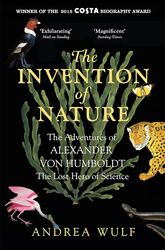
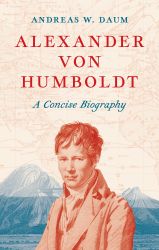
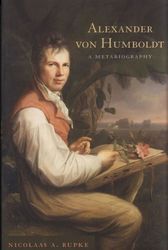
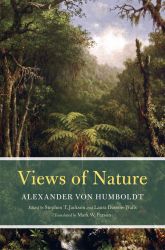
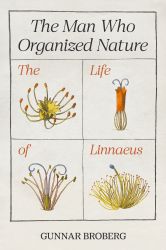
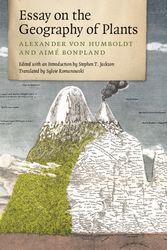
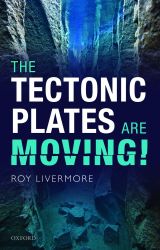

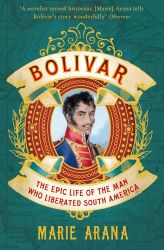
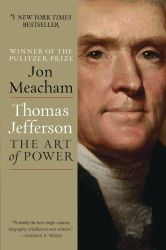
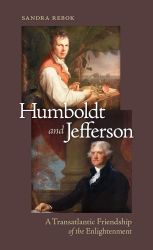
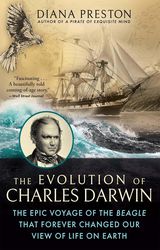

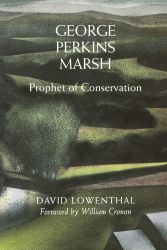
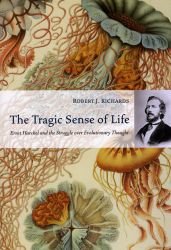

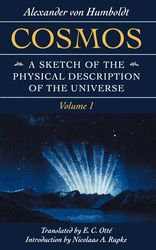
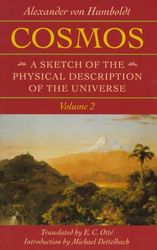
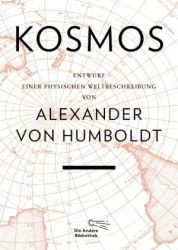
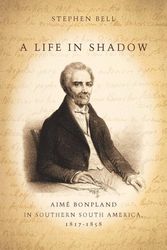
I read ‘The Invention of Nature’ when it came out and had the opportunity to discuss it with Andrea Wulf during a Q&A session. Despite this, I remained unsure about Humboldt’s specific contributions and their impact. I must be missing something. Did you understand what Humboldt changed in the concept of nature and life, concepts that we often conflate today and see as a flat ontology?
LikeLiked by 1 person
Hi Michele, nice to hear you had the opportunity to discuss the book with her.
You are quite right to be left with that impression and it is something that came up explicitly when I read Daum’s biography. He puts it well in his final chapter: “Unlike Darwin, Humboldt did not come up with a clearly defined theory that fundamentally changed scientific and social thinking. Humboldt was neither a revolutionary in the scholarly
realm nor one in the political world. But he left us with myriad complex thoughts and incentives for further research.” (p. 151)
My take is that he inspired many people with his ideas and his way of viewing nature. Despite my criticism about Wulf’s book going on tangents, that is exactly what she shows so well by profiling so many other scholars, naturalists, and statesmen contemporary with him or coming after him (i.e. the chapters on Goethe, Bolívar, Jefferson, Darwin, Haeckel, Marsh, Muir, and Thoreau).
LikeLike